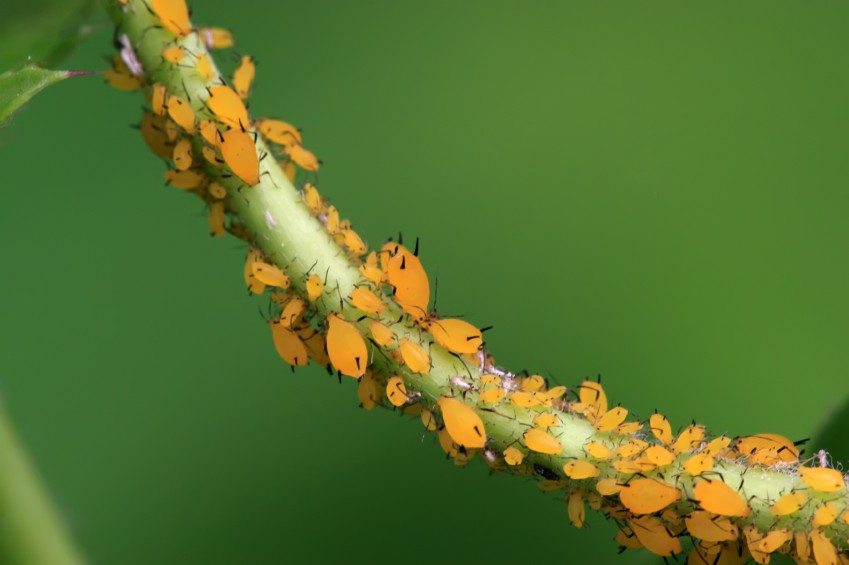Killing Aphids Naturally: How To Get Rid Of Aphids Safely

Teo Spengler

Sign up for the Gardening Know How newsletter today and receive a free copy of our e-book "How to Grow Delicious Tomatoes".
You are now subscribed
Your newsletter sign-up was successful
Yellowing and distorted leaves, stunted growth, and an unsightly black and sticky substance on a plant may mean that you have aphids.
Aphids are among the most annoying common pests in the garden. These small insects have soft, pear-shaped bodies (green, yellow, brown, red or black) and piercing mouthparts. Confirm that you are dealing with aphids by looking for a tubelike structure projecting from the hind end of the body.
How to Get Rid of Aphids Naturally
Aphids won’t bite you, but they do bite your plants. They feed on a wide range of plants, using their piercing mouthparts to suck out all the juice. While a few bugs won’t kill a plant, a larger aphid infestation can cause foliage to warp and curl, and open the door to aphid-transmitted viruses. In severe cases the plant fails to thrive.
As they feed, aphids secrete a sticky substance called honeydew, which quickly becomes infested with black sooty mold. They also spread viruses, many of which are incurable. For this reason, it’s important to take steps toward controlling aphids in the garden.
Killing aphids naturally is not only better for the environment, it's also more effective. You can get them under control by taking advantage of their weaknesses and making a few changes in the way you manage your garden.
Getting Rid of Aphids
If you have more than a few aphids, you’ll want to protect your plants by getting rid of them. How to kill aphids? Don’t even think about bringing in broad spectrum insecticides to take out these small pests. Doing that will eliminate insects that are on your side in the insect battle: predator insects like ladybugs that eat nuisance bugs.
Instead, think natural aphid control. Use one or more of the “natural” methods to rid a plant of aphids: water, dish soap, or neem oil.
Sign up for the Gardening Know How newsletter today and receive a free copy of our e-book "How to Grow Delicious Tomatoes".
Spray With Water
Physically removing the aphids from the leaves is the safest way to get rid of them and is a good place to start with organic aphid control. Okay, they are soft and squishy, but you don’t have to pick them off with your fingers. Instead, use a hard jet of spray from the hose. Be sure you hit the underside of leaves as well as the top, since the bugs often hang out there.
If you don't already have a nozzle for the hose, this AUTOMAN Garden Hose Nozzle from Amazon has the jet spray as one of seven water patterns
Dish Soap Mix
You don’t have to buy commercial insecticidal soap to spray on your aphid-infested plants. Just mix up a cup of vegetable oil or a pint of water with two teaspoons of dish soap. Then spray it right on the bugs with a spray bottle; any of these from Amazon will do. Experts say that this works by removing the protective coating on the exterior of the aphids, resulting in them drying out quickly and dying. Remember though: only the aphids you hit directly with the mixture will be eliminated.
Neem Oil
If you aren’t the “mix-it up yourself” type, pick up a spray bottle of neem oil at the garden store. Neem oil is made from seeds of the neem tree and contains several insecticidal and fungicidal chemical compounds. Different extracts are mixed with fatty acids and sold at garden centers as neem oil. It kills aphids in the same manner dish soap and water does, so direct contact with the bugs is necessary. The oil helps to smother them.
Preventing Aphid Problems
Preventing an aphid population from building up in your garden is perhaps easier than taking them out once they have a foothold. The best way to keep the population minimal is to reduce aphid-attracting plants, maintain plant health, and do everything you can to get and keep beneficial insects in your garden.
Design your landscape with care
Some plants just attract aphids. These include trees like birches, for example, and new growth on succulents. It’s a good idea to keep aphid-attracting plants away from aphid-vulnerable plants.
Keep plants healthy
It's always easier for healthy plants, provided with adequate nutrients, water and sunlight, to fight off pests. Give your plants appropriate cultural care and don’t over-fertilize.
Grow plants that attract natural predators
Aphids have a number of natural enemies, and these insects are much better at controlling aphids than any other method available to gardeners. Pampering and nurturing their natural enemies is an excellent method of organic aphid control.
Encourage natural aphid predators like ladybugs and green lacewings to land and stay in the area by growing plants they need and like. These include yarrow, wild buckwheat, white sweet clover, tansy, sweet fennel, sweet alyssum, spearmint, Queen Anne's lace, hairy vetch, flowering buckwheat, crimson clover, cowpeas, common knotweed and caraway.
Purchase beneficial insects
Did you know you can increase the number of “good” predator bugs in your garden by buying a supply at the garden store and releasing them near your vulnerable plants? It's true! If you buy ladybugs, be sure to release them in the cool of the evening. Those released on a sunny afternoon may well fly over to your neighbor’s yard instead.
Get rid of the ants
While predatory insects are bent on destroying aphids, ants in the garden are their sworn protectors. Ants feed on the honeydew produced by aphids, so it is in their best interest to defend this precious resource. Getting rid of the ants so that the predatory insects can do their job is an important part of a good aphid control program.
Control ants by trimming the lower parts of the plant so that they don’t touch the ground and give ants easy access. Coat the lower part of the stem with a sticky substance to prevent the ants from climbing. You can apply the sticky substance directly to the trunk of thick-barked trees and shrubs. Wrap the stems of smaller plants in tape and apply the product to the tape rather than the stem. Most of the time, however, the use of an organic aphid control pesticide, such as neem oil, will take care of the ants as well.
More Organic Aphid Control Methods
Killing aphids naturally is better for your plants, the environment, and beneficial bugs in your garden. Here are some more natural deterrents for controlling aphids.
Grow young plants under row covers. Remember to remove the covers when the plants begin to flower.
Use aluminum foil or reflective mulch on the ground beneath the plants. While you may not want to do this in your flower garden, reflective mulch in the vegetable garden is a very effective deterrent.
The following plants are actually attractive to aphids. Use them as a trap crop by growing them far from your garden. They will lure the aphids away and keep the garden aphid-free.
- Nasturtium
- Aster
- Mum
- Cosmos
- Hollyhock
- Larkspur
- Tuberous begonia
- Verbena
- Dahlia
- Zinnia
You can also try planting garlic or onions near infested plants, as the smell drives aphids away.

Heather Rhoades founded Gardening Know How in 2007. She holds degrees from Cleveland State University and Northern Kentucky University. She is an avid gardener with a passion for community, and is a recipient of the Master Gardeners of Ohio Lifetime Achievement Award.
- Teo SpenglerWriter